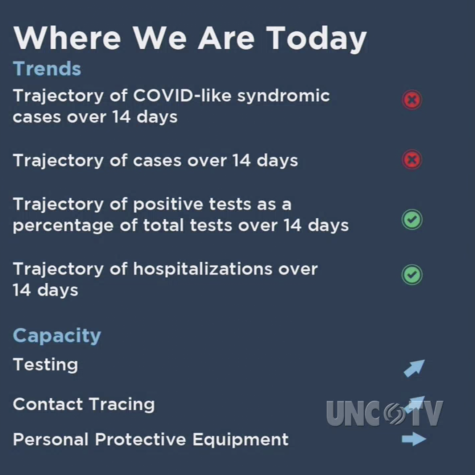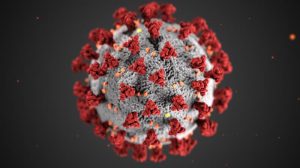Gov. Roy Cooper says North Carolina could move into phase one of COVID-19 reopening next week
April 30, 2020
In a press conference Thursday, Gov. Roy Cooper announced that based on metrics and trends of COVID-19 in North Carolina, he believes the state can begin to move into its first phase of reopening.
“My message today is to stay vigilant. Right now, we need people to continue following the stay at home order so that we can move into the phases of easing restrictions,” Cooper said. “Complacency could risk lives and undo these plans.”
Cooper said phased reopening is like a “dimmer switch,” which allows the state to gradually open without spiking COVID-19 cases.
“That’s why we’re looking at facts and science to guide the way. That’s why we’re asking businesses to take precautions for their employees and customers. We must get the economy running better, but we need working people to trust that they will feel safe as we move forward,” Cooper said.
Mandy Cohen, secretary of the North Carolina Department of Health and Human Services, said “the picture is mixed” for North Carolina’s metrics, but she is optimistic.
The metrics North Carolina is using to determine reopening include:
- COVID-like syndromic cases over 14 days
- Lab-confirmed cases over 14 days
- Positive tests as a percentage of total tests over 14 days
- Hospitalizations over 14 days
Last week, Cohen said North Carolina was seeing a decline in the first metric; however, the other three did not show a decline.

This graphic shows metrics the North Carolina Department of Health and Human Services is evaluating to create plans for reopening.
Today, Cohen announced that North Carolina is now seeing a slight uptick in COVID-like syndromic cases and lab-confirmed cases over the last seven days, but a decline in positive tests as a percentage of total tests and total hospitalizations over the last seven days.
Because of these metrics, Cooper said North Carolina is looking to enter phase one of reopening next week.
Cooper also spoke on research taking place at UNC Chapel Hill testing treatment of the drug remdesivir on COVID-19 patients. He thanked researchers and said it shows the importance of research at state universities.
“Learning about new drugs and vaccine development is encouraging. But they will take time. Our job is to do what we know works right now. Keep our physical distance, sanitize, stay at home. I know this is a difficult time for many people, but there is hope and there is a plan,” Cooper said.
Mike Sprayberry, North Carolina’s director of Emergency Management, said the state will receive over 100,000 cloth face masks for people working in the food supply chain.
North Carolina’s stay at home order is currently set to expire May 8.
















